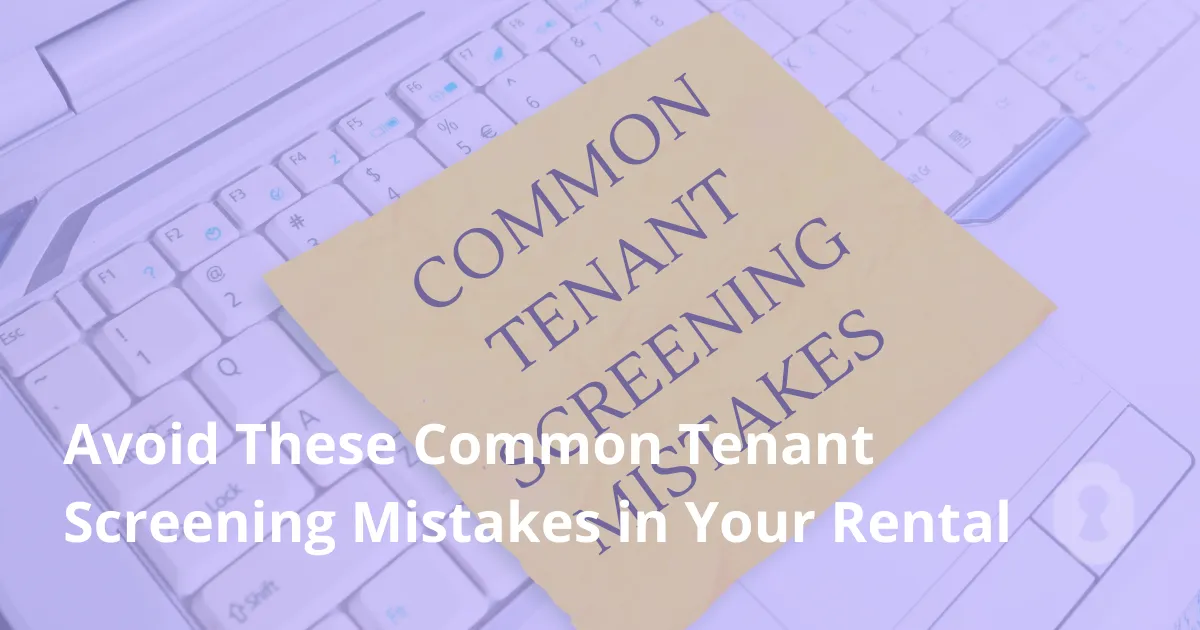
Did you know a bad rental tenant can cost landlords thousands?
Effective tenant screening is key to avoid these costs. It's your first chance to prevent a bad tenancy and maximize housing opportunities for quality renters.

Making costly tenant screening errors can lead to big problems. First-time landlords are often at risk, especially when managers make during the screening process critical oversights.
Knowing the common mistakes with practical tips helps you find better tenants and keep your property safe.
"The most overlooked asset in property management isn't the building—it's the screening process that determines who calls it home. When we view tenant screening not as a defensive barrier but as a foundation for community building, we transform the entire rental experience. Quality screening isn't about keeping people out; it's about creating the conditions where both property and people can flourish together. The difference between a property that drains resources and one that builds wealth often comes down to those critical hours spent verifying that the relationship you're entering will be mutually beneficial for years to come."
Taylor Wilson, CEO of Rent with Clara

Landlords who don't screen tenants well may face big problems later. Inaccurate tenant screening can result in costs and time lost that can be huge. It affects the landlord, other tenants, and the property's value.
Bad tenants can lead to financial headaches. This includes damage to the property, missed rent, and the cost of eviction.
Experts say, "Skipping tenant screening can lead to expensive evictions, late payments, and damage." When one tenant causes problems, it can affect your entire rental portfolio.
"A thorough tenant screening process is essential to avoid the financial pitfalls associated with problematic tenants."
For more info on avoiding tenant screening mistakes, check this resource.
The financial hit can be big. Evicting a tenant can cost $1,500 to $5,000 or more. Property damage can also cost thousands to fix. Working with tenant screening companies can help reduce these risks.
Dealing with tough tenants is costly and time-consuming. Landlords spend hours on complaints, disputes, and evictions.
This time could be used for better things like property management or finding new tenants. It's easy to make mistakes when you're overwhelmed with problem tenants.
Key time-related challenges include:
Bad tenants can make life hard for others in the building. This can lead to more people leaving and affects how future applicants will behave as a renter. It also makes it harder to find good tenants in the future and limits housing opportunities for quality applicants.
The ripple effect of poor tenant screening can be far-reaching. It affects not just money and time but also the property's future.

Landlords need to screen tenants well to find good ones. But, many make tenant screening errors that can be fixed.
A good screening process helps find reliable tenants and avoid problems while building your reputation as a landlord.
Rushing through tenant screening can miss important details in your tenant screening report. It's important to carefully check each applicant's info when they're applying for a rental home. This includes credit reports, rental history, and job verification as key steps in the screening process.
Key areas to focus on:
First impressions can be wrong. Relying only on them can lead to bad choices and mistakes can immensely help you avoid future problems.
It's important to look beyond the first meeting and check the applicant's qualifications and history through personal and professional references.
Consider the following:
Being inconsistent in screening can lead to legal trouble and potential tenants and even potential discrimination issues. Landlords should have clear, consistent criteria for tenants to keep your screening process in compliance.
Best practices include:
Without a standard policy, decision-making can be unfair and represents a mistake during screening like treating applicants differently. Landlords should have a detailed policy for screening. This policy should outline the process and criteria to enhance your tenant screening effectiveness.
Key components of a screening policy:
To find a reliable tenant, it's key to do thorough background and credit checks. These steps in the screening process help you know if a potential tenant is trustworthy and financially stable. This affects your rental income and how well you manage your property.
Many landlords skip doing full background checks, which is a third big mistake in tenant screening. This mistake can lead to renting to people with bad behavior or money problems.
A good background check includes parts of the background check that look at the tenant's rental history, credit score, and any past evictions or crimes.
Another common mistake is misunderstanding credit reports and not knowing when an item on a credit report should be concerning. Credit scores are key in seeing if a tenant can handle their finances. But, credit reports can have mistakes.
An eviction or bankruptcy check is an automatic cause for additional scrutiny. Landlords should help tenants check their reports and fix any wrongs. For help, landlords can use the FTC's guide on disputing errors in background checks.
Screening is failing to verify income properly is a major oversight. It's important to check if a tenant can pay the rent.
Landlords should ask for proof of income, like pay stubs or tax returns.
They should also call employers to confirm the job. This helps avoid renting to people who can't pay and helps predict renter's likely future behavior.
Not checking a tenant's criminal history can be risky and represents inaccurate tenant screening. It could lead to property damage or harm to other tenants.
While fair housing laws must be followed, criminal history checks are important parts of the background check. It's also important to check everyone equally to avoid discrimination claims.
Landlords often make a big mistake by not checking a tenant's rental history and references properly. This can lead to renting out to tenants who might damage your property or not pay on time and limits housing opportunities for better applicants.
It's key to talk to a tenant's previous landlords. This helps you understand their past, including how they paid and if they damaged any properties. Not doing this can mean missing important signs that could warn you about renter's likely future behavior.
Just one reference isn't enough to know if a tenant is reliable. You should talk to several personal and professional references to get a full picture. This includes landlords, property managers, and even personal references to identify possible red flags.
Any gaps in a tenant's rental history can be a warning sign. It might mean they were evicted or homeless.
You should look into these gaps to understand what happened. Ignoring them can lead to problems with your tenants and missed opportunities for a great tenant.
Eviction records are very important and should be included in any report or a background check. Not checking them can mean you're renting to someone who was kicked out before.
This can cause legal and financial issues. Always check for any eviction records when you're screening tenants to ensure better tenant retention.
By avoiding these common mistakes, landlords can lower the risk of bad tenants. Being careful and thorough in the screening process helps protect your property and keeps your relationship with tenants smooth.
Landlords face many legal hurdles when screening tenants. It's key to follow these rules to avoid legal trouble and ensure fairness while working with professional tenant screening companies.
Fair housing laws ban discrimination based on race, color, and more. Landlords must treat all applicants the same to follow these laws and keep your screening process in compliance. This is standard in rental markets nationwide.
Asking different questions or standards for some applicants is wrong. It's important to ask the right questions to check if a tenant can rent and care for the property while they're applying for a rental home.
"The Fair Housing Act makes it unlawful to discriminate in the sale, rental, or financing of housing based on certain characteristics."
Fair Housing Act
Landlords must protect applicant data carefully when they run credit and background checks. This means keeping personal info safe and only getting what's needed for screening.
Many choose to automate the screening process to reduce errors.
Being open with applicants about data use is also key. Landlords should have a clear privacy policy that explains how tenant reports will be handled.
If a landlord denies an applicant, they must give an adverse action notice. This notice should explain why and mention the credit agency used to avoid understandings.
Not giving the right notice can lead to legal trouble. For more on this, visit CLA Legal.
Landlords must also follow state laws on tenant screening. These laws cover credit checks, background checks, and fees.
Knowing your rental markets laws is vital for staying compliant and avoiding legal problems.
Landlords can protect their rental property by avoiding common tenant screening errors. A detailed screening process is key to finding reliable tenants and creating opportunities for a great tenant. These tenants will pay rent on time and take good care of the property.
A good tenant screening process reduces risks and boosts rental property potential. It includes background checks, credit checks, and rental history verification to identify possible red flags. This helps spot high-risk applicants early on.
Landlords who screen tenants well can avoid property damage, evictions, and other problems while building their reputation as a landlord. Following a solid screening process makes them look professional and trustworthy. This attracts reliable tenants and keeps cash flow positive.
By using these strategies and learning from mistakes with practical tips, landlords can protect their investments and succeed in the competitive rental market for the long term.